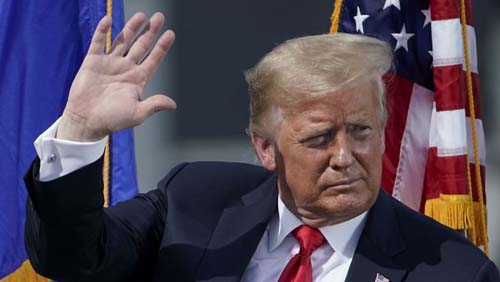
Last 9 weeks How will Trump spend his final days in office?
Jackie Dunham
Toronto: Days after the US election was called, President Donald Trump still refuses to concede to his Democratic rival Joe Biden as he holds out hope the election results might still go his way.
And while Biden and his team are preparing for their move to the White House, Trump is still in power until January 20.
That’s a little more than two months, during which the outgoing president will have the same authority as he has always had in office.

If the president’s reaction in the initial aftermath of the election is any indication, one expert said the US could be in for a “rocky” period of transition between the two administrations.
Matthew Lebo, a political science professor at Western University in London, Ont., cited Trump’s firing of his defence secretary, Mark Esper, as an early sign of the disruption to come.
“This wasn’t just a staffer that he fired. This was the secretary of defence. This is somebody overseeing an $800 billion budget and he fired him in a tweet,” Lebo told CTV’s Your Morning. “There’s going to be a lot of this, I think.”
Esper had a tense relationship with Trump after disagreeing with him on several key issues in the past year, including his recent opposition to the president’s desire to use active-duty troops to subdue protests in US cities following the death of George Floyd in police custody in May.
The firing of Esper has raised concerns that other top national security officials, such as CIA Director Gina Haspel and FBI Director Christopher Wray, may be next on the chopping block due to their past disagreements with the president.
If Trump fires a number of senior officials in these key agencies, it could disrupt their operations and make the transition more difficult when Biden assumes office in January.
In addition to the upheaval he could cause in top federal agencies, Trump’s refusal to commit to a peaceful transition of power may have significant repercussions for the country’s fight against COVID-19.
Under U.S. law, the formal presidential transition can’t begin until the administrator of the federal General Services Administration (GSA), Emily Murphy, recognizes the “apparent successful candidate” in the election. Once the “ascertainment” declaration is made, the incoming president’s team will have access to federal funds and agencies so they can make appointments and plan for a smooth transition.
Typically, the ascertainment is declared soon after the results of the election have been announced, but Murphy – a Trump appointee – has yet to recognize Biden as the next president.
A delay in greenlighting the formal transition process could hinder Biden’s team in filling appointments in the government, which is particularly worrisome during the pandemic when critical national health postings need to be filled.
Lebo said if Trump follows through on his threats of firing the country’s top infectious disease specialist, Dr. Anthony Fauci, he could further impede the government’s response to the crisis.
“The Trump administration is doing very little at the moment, there’s very little of a federal co-ordinated response,” Lebo said. “We don’t know what’s going on in terms of ramping up companies’ capacity to create a vaccine. So I think a lot of what Biden will be doing is just sort of acting independently and getting ready to jump into action in January.”
The disarray caused by Trump’s refusal to accept the results of the election has been magnified by the mixed reactions of Republicans – some of whom have encouraged the president to concede in order to ensure a smooth transition while others have sided with him.
Lebo said Trump still has a lot of influence among Republicans, which may be why some of the party’s senior leaders have refused to distance themselves from him, despite his loss.
Neither Senate Majority Leader Mitch McConnell, House Republican leader Kevin McCarthy, nor Senate Judiciary Chairman Lindsey Graham have recognized Biden as the next president and appear to support the president’s plans to challenge the results of the election.
“They’re thinking about the future and all of Trump’s voters and they don’t want to be sort of outed as against the president in this key moment,” Lebo said. “They want to be sure that they can rely on those voters in the future.”
Lebo said he expects Trump will try to hold on to his power over the Republican Party and US politics, in general, for some time after he leaves the White House.
“I imagine a lot of tweeting,” he said. “He’ll try to critique the presidency from the outside, much like he did under President Obama’s terms. He was always tweeting and sort of worked his way into the political discussion.”
Ends
